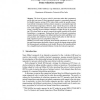284 search results - page 18 / 57 » Quantifying process equivalence based on observed behavior |
MABS
1998
Springer
15 years 4 months ago
1998
Springer
In this paper, we present some of our ongoing experimental research towards investigating advantages of modeling other agents in multiagent environments. We attempt to quantify the...
122
click to vote
MOBIHOC
2006
ACM
15 years 11 months ago
2006
ACM
Recent studies on mobility modeling have focused on characterizing user mobility from real traces of wireless LANs (WLANs) and creating mobility models based on such characterizat...
EVOW
2009
Springer
15 years 3 months ago
2009
Springer
In this paper the node-level decision unit of a self-learning anomaly detection mechanism for office monitoring with wireless sensor nodes is presented. The node-level decision uni...
CONCUR
2005
Springer
15 years 5 months ago
2005
Springer
The focus of process calculi is interaction rather than computation, and for this very reason: (i) their operational semantics is conveniently expressed by labelled transition syst...
HICSS
2003
IEEE
15 years 5 months ago
2003
IEEE
Basically, instrumental conditioning is learning through consequences: Behavior that produces positive results (high “instrumental response”) is reinforced, and that which pro...

